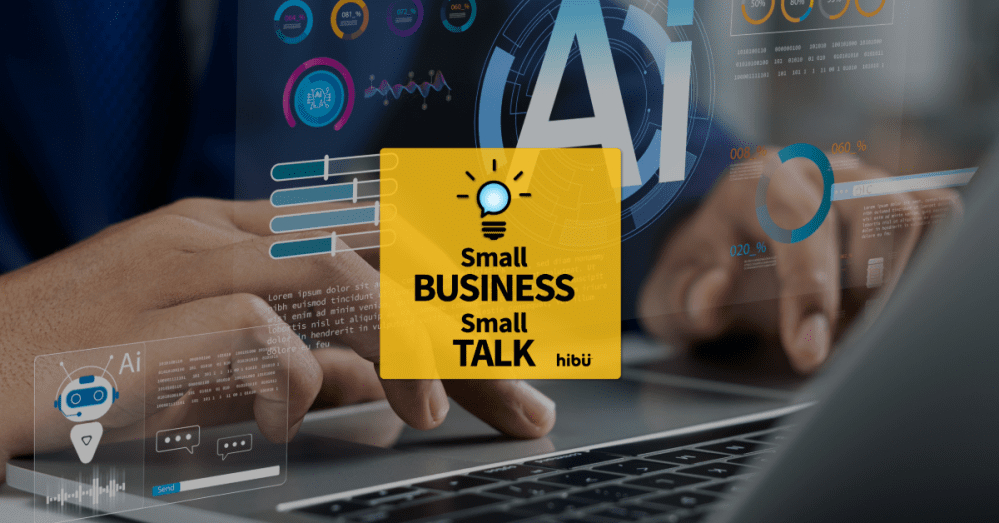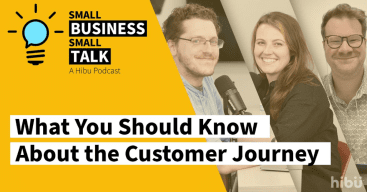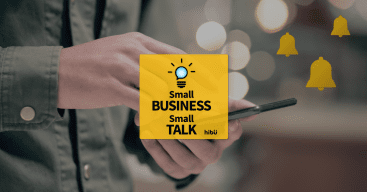AI is everywhere – it’s on our phones, it’s in our cars, and it’s definitely having an affect on how customers find your business online. Join Ian Messinger and Lauren Schenk as they discuss the growing power of AI with Hibu's Chief Information Officer Ira Klein and Senior Project Manager Gretchen Ast.
They talk through AI's evolution, including machine learning (supervised and unsupervised) and generative AI, and they delve into how Google's AI-generated answers (AIO) has already changed the search results page in a big way, and the importance of SEO, local rankings, and E-A-T (Expertise, Authoritativeness, Trustworthiness) for small businesses.
They also discuss all the ways Hibu is using AI to help clients improve content quality, avoid time-wasting robo-calls, and streamline customer review generation. Hear why it’s important for your small business to adapt to AI's evolving role in search and customer engagement, and how Hibu can help you take the next step.
[TRANSCRIPT]
Ian, Lauren, Ira, Gretchen, Narrator
Ian 00:00
Hi! I'm Ian messenger with my co-host, Lauren Shank.
Lauren 00:04
Hi there!
Ian 00:06
Thanks for joining us for this episode of Small Business, Small Talk powered by Hibu. Today we're going to talk through a topic everyone is talking about: AI. And we're joined today by Ira Klein, Hibu's Chief Information Officer, and Gretchen Ast, Hibu’s Senior Product Manager. Welcome! Thanks for being here.
Gretchen 00:24
Thanks for having us.
Ian 0:25
Sure, sure! So, let's start high level. What is AI? We all hear the word these days. Sometimes in, you know, fun context like sports stats or self-driving cars, maybe sometimes in negative context, but what is it really?
Ira 00:42
AI, artificial intelligence, has been around for years. I think a lot of people think it's kind of new um since generative AI has come out that's what everybody thinks about. Or maybe they're watching a football game, and AWS talks about the game stats and the AI that went into that, but AI has been around for many years. If you think back playing chess on your computer right, that's artificial intelligence. Really what it is, is having a machine doing some activity that mimics what you would think of as human intelligence. So that could be something as understanding language, playing a game, as I mentioned before, making recommendations, or helping you make decisions, making predictions, problem solving, as you mentioned self-driving vehicles, or recognizing patterns. In business artificial intelligence, generally speaking, people look at it, they're using kind of two versions of it. Machine learning or generative AI. On the machine learning side of things there's two types of machine learning. There's supervised machine learning and unsupervised machine learning. In supervised machine learning you're going to want to provide a large sample of data. So, say, as an example, you wanted to figure out who is … you want to try to predict who's going to buy real estate, right? So, what you'll do is, you'll take labeled data, labeled data is where you have a set of data and you labeled it as bought or didn't buy, you know. Yes or no, something like that. And the machine learning algorithms will take, you know, a few thousand examples split it out 70%, it'll train the model on, and then the last 30% it'll use to test itself to see how accurate it is. Typically, machine learning is not going to be 100% accurate. If it is there's something in the data that's actually cheating. It's actually giving … it's showing some bias. It's actually putting bias into it. But what it will do is it'll create that model for you and then you could use that model and take other data, put it into that model, and you could get a prediction. This person's likely to buy, this person is not likely to buy, that kind of thing. And then there's unsupervised learning. Unsupervised learning is where you're not going to have labeled data, and what you're going to do is you're going to have the model look at clusters, look at patterns, look at predicting things. So, as an example, when you go onto an e-commerce site, like Amazon, and you start looking for things it starts to say, “well if you're interested in that, you're probably interested in all these things.” And that's unsupervised learning. It's learning that based on people's behavior as they are shopping. What they, they bought this, they also like to look at this, this, this, and this, and that pattern that starts to evolve is what's called “unsupervised learning.” In the area of gen AI, gen AI is a machine learning model that uses what's called “Deep learning.” Where you take massive amounts of data, i.e. all of the data that's out there on the public internet and you build a model that allows the machine to understand language, be able to respond to questions, write code, generate images, those types of things. So that's kind of the newest view of what artificial intelligence is and that's pretty much what's been making the press in the last two, three years.
Lauren 04:15
Yeah, so that's your ChatGPT that everybody's plugging questions into.
Ira 04:18
Right.
Ian 04:19
Well, and it's interesting that you, you know, just going back to your first point about how this is, you know, it's performing functions that a human could do, but at scale. And at speed. I mean when you talk about the, uh the, example of, you know, a model of who's going to buy or not buy real estate, I mean that's not something new and unusual. Market analysts have done that, you know, manually for as long as there's been real estate sales. It's just a matter of you know now it can be automated to some degree and really scaled up with AI.
Ira 04:53
Yeah.
Lauren 04:54
When I'm on Google and typing my question in, I notice, and we all have, that Google answers me with an AI response. What is that about? Gretchen, I think I need to know from you.
Gretchen 05:10
Yeah! Yeah, that's a great question. So, many people have been seeing this come up. It started off as Google search generative experience and initially it was something you could opt into. But as of June, of this year it's no longer an opt-in. Essentially if you are on Google and you're using it, you are eligible to see what's called Google's “AIO.” So, essentially this is an AI overview. They're trying to answer your question for you so that you don't have to scroll through all of the search results to try to find that information. There have been some problems with it as there always are when we start these things, and initially Google started to pull back on returning these answers, because they were finding some problems. They were misleading their audience by providing some answers based on some sources that weren't reputable and so as with anything they've continued to adjust and tweak. So you'll notice that you might have seen a lot of answers come back in June, that tapered off. In July we were down to only 7% of searches were coming back with an AIO. At the end of July, however, based on our own internal research it does seem like this is actually increasing again, but only for informational searches. So, what that means because we're like, “well isn't anything that I type into Google aren't I looking for information?” That typically is used to mean a fact-based question or search. So, you're going to Google, maybe you're saying, you know, “how many people broke a world record at the Olympics this year?” Right? Something that Google can scroll through all of the information on the internet and return that answer and know because it's a fact, that they are returning a fact-based answer there. So, more and more, in my own personal use, I've been seeing AIO come up at the top. Sometimes it's incredibly helpful, sometimes, as I'm sure you guys have seen in your own personal use as well, it's really not. You're like, “no that's not what I was asking you.” You change like one little word and then you're able to find that information. So, it's experimental, it's still going to get changed and tweaked. If you don't see your answer, you might want to try a different inquiry or scroll through the results and see if you can find that there. The one thing to keep in mind here is because the informational searches are typically what AIO is being returned for, that's not typically what our small business owners need to be concerned about.
Ian 08:01
I was gonna ask, yeah. Right. Because “best pizza place near me” is probably not a factual search.
Gretchen 08:09
Yes, exactly. So, it's going to be more transactional searches, right. “Best pizza place near me,” “plumbers near me,” “roofing contractors in my town,” “auto repair for electric cars,” things like that are more transactional, you're looking for a product or a service that you want to do business with now. Those transactional searches very rarely are you going to see AIO returned. Every once in a while you might. I myself when I was doing my own personal research for something, I saw this awesome grid search right at the top. It showed me all these local businesses with the business name and just an image next to it and I was like, “oh my gosh, this is amazing!” I've never seen it again. So, there's a few different previews that Google has provided and they’re testing, they're trying to gather information. How's the public engaging when we show these results for transactional searches? And so, they'll continue to do that. Something that you see today you might never see again. But they're going to gather that data and try to figure out the best way to show results for these transactional searches where it's really just, “hey this is what's available to you, which businesses do you want to engage in?” So, that's just a little information about AIO and how we might be seeing it.
Ian 9:35
Yeah, and I think we've all we've all seen that. Whether it's, you know, on a desktop search, on our phones, you know, there's something that pops up. And I remember reading years ago, I mean well before, you know, Google released Bard and now Gemini, you know, Google had said at a conference like, “we want to be an answer engine, not a search engine,” you know, “our goal is to make our users, the people conducting the searches, as efficient as possible.” And it feels like this is a step in that direction of, you know, at least for those informational searches, you don't have to go through the search results. You're just going to see, “oh there were eight previous standing World Records broken at the Olympics in 2024.” Which I did not check with AI so don't, you know, that is not a fact. But along those lines, so, what does that mean, both in terms of obviously like you just said the transactional searches, which are typically where someone might be looking for one of Hibu's clients, you know. Small businesses are really not that heavily impacted by AIO yet, but what impacts could you foresee for a small business as those AI search results start to pop up more frequently?
Gretechen 10:45
Yeah, so there's always the concern that this might start to get rolled out. Google's generally not very transparent about when they're going to start doing those things or what a small business needs to do in order to stay competitive. So, what we've done is a lot of research, you know, both trying to find reputable sources and then our own internal testing to try to determine the best way for small businesses to stay relevant and make sure that they're still going to get returned in results even after AIO will start to roll out more broadly for transactional searches. So, the biggest thing to keep in mind is when you see AIO, it's going to push the results, those individual website results, down the page. And so that can definitely be a concern because even if you're in the number one position, a user might not see you if they find the information that they're looking for right at the top. So, what we typically see with these transactional searches, where multiple businesses may be relevant to what this user is searching for, typically you're going to see multiple businesses at the top like what you see with the map pack if you're doing a search today for a business, you'll see those right up there. So, you'll still be eligible to show at the top of results. And typically what we're finding is that if you want to still show up at the top of results if AIO returns your business, you're going to need to do a few things. If you have been on top of your search engine optimization or you’re a Local Ranking client with us here at Hibu, none of this is going to sound new, but it is going to become more and more important. What you're going to want to make sure that you do, you want to have your Google Business Profile. Absolutely a must. You want to have a full profile built out with all the relevant information about your business on there. You're also going to want to make sure you have a high number of third-party reviews. Whether that's on your Google Business Profile or they're gathered from other sources across the internet, because Google will take those and they'll add that to your aggregate score. But you want recent reviews and you want to have a score or rating between a 4.6 and a 4.9. That's really the sweet spot. If you get a couple of bad reviews you, you know, you can easily try to combat that by responding to them. That's a great option. Or asking those people that you know have a great experience with your business to write a review for you. So, that's definitely going to be key. You want to make sure you have schema markup on your website, so you're, you know, if you have a Hibu Smart Site we make sure that we do that for you, so that way you can return in those rich results at the top. Which sometimes, when we've been testing this AIO with transactional searches, that's what's coming back. So, you want to have that on your site. You want to make sure that your website is optimized for the keywords that you care about. So, if a user is going in and typing in whatever search is going to be most relevant for your business, or searches I should say, you want to make sure that that's what you're optimizing your website for. And then something that hopefully everyone's familiar with at this point but, it's a term called E-E-A-T, which Google has been using for years now. And they added the second “E” within the past couple of years, but it stands for experience, expertise, authoritativeness, and trustworthiness. So, essentially this is the algorithm that Google uses to determine whether or not a business should be returned higher in search results. And there's a few different things that you can do to make sure that that your site is going to be returned in addition to what I've already mentioned. You want to have long form content on your site that answers those questions that a user might type into the search bar that you could possibly answer on your website. So, you want to keep that in mind when you're providing information for your website or if you're working with an agency or a company like us, you want to make sure that you provide that information so that we can make sure that you're going to be returned. Blog posts are a great way to do this and to keep your content relevant and updated on your site. We offer that with Local Ranking. Obviously, clients can do that on their own as well. And then anything that really makes your business unique and helps you stand out against the competition. You want to make sure that you're highlighting that because that might be what sets you apart and what makes Google go, “oh hey, yeah that's exactly what they're looking for!” Maybe it's a certification, maybe it's a specific type of customization that you do, but you want to make sure that you have that information on your site and that it's going to be easily found by search engines.
Narrator 16:00
You're listening to Small Business, Small Talk powered by Hibu. Hibu is the country's leading provider of synchronized digital marketing for small businesses. Delivering more visibility, more visitors, more leads, and more customers. Visit us today at hibu.com. H-I-B-U, hibu.com.
Ian 16:21
And we're back talking about AI and its impact on local business websites with Ira Klein, Hibu’s Chief Information Officer, and Gretchen Ast, Hibu’s Senior Product Manager.
Lauren 16:32
So, it's a lot of work to be done to keep up with these ever-changing times and now we have to, you know, work with AI and really make sure that businesses have all of their, you know,
stuff enriched. But going back to Ira. From a business perspective what are we
doing at Hibu to utilize AI to help our clients aside from all the things that that Gretchen brought up.
Ira 16:55
Well, we're doing a lot of things. Both, I'll call it internally and externally. We're using AI in a lot of ways that help us, right? Do our jobs better and we're using AI to help our small business owners also succeed. We're using it today to help improve the quality of the content that we use for advertising products or websites. So, we're using it, as a lot of companies are, we’re using it to help generate rich content for websites and for social ads and things like that. On our dashboard, you can see your leads. We have transcripts of calls. In those transcripts we generate a score, so we're separating robo calls, messages left by robo call, versus something of higher quality. Maybe somebody looking for an appointment or something like that. So, we're using AI to generate those kinds of calls. For some of our customers, and soon to come for many for … all of our customers, is for those of you that get that have your reviews through our products, being able to recommend responses, perhaps to reviews. To get you to respond more frequently to reviews. Positive and negative. Summarizing calls. You get a long call, you look at a transcript that could be 10 minutes of back and forth, right? Getting a summary of that call so that you can get a better view of what happened on calls much quicker.
Ian 18:22
Yeah, so for our clients, it's kind of a triple threat. Well, “threat's” probably not the right word, but a Triple Crown, maybe? I don't know. But it's helping with the onboarding process, you know, it's taking that information that's out there and allowing us to validate or confirm it, rather than sit there for 10 minutes going, “how about this brand, how about this brand, how about this certificate.” It's also allowing us to tell them very quickly, you know, “hey this was a quality call that came in,” versus “this was a robo call.” And then as far as next steps they can take, it's eventually going to give them some tools to, you know, respond to reviews respond to, you know, maybe even respond to some of those calls, or incoming chats, or something with, you know, so they're not sitting there kind of, you know, hitting writers block and going, “I just I don't know what to say,” you know. It'll sort of prompt them and give them tools at their disposal to help run their business a little bit better. I think that's a great point to end on everybody. Ira, Gretchen, thank you again for joining us and helping all of us get a better handle on AI and how it's affecting local businesses. To all of you listening, if you liked what you heard on this episode be sure to subscribe. And please, if you can, leave us a review. It really does help. Until next Time, this is Small Business, Small Talk out.
Narrator 19:40
Thanks for listening to this episode of Small Business, Small Talk powered by Hibu. Hibu is a leading provider of synchronized digital marketing for small businesses across America. With Hibu, you get all the digital marketing your business needs all from a single provider, all working together to maximize results. Visit us today at hibu.com. H-I-B-U, hibu.com.



